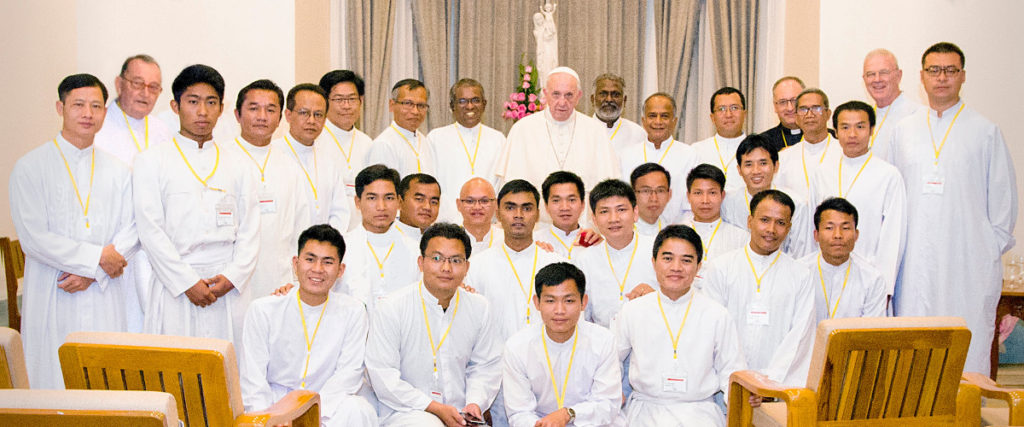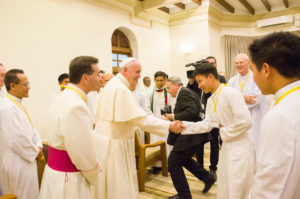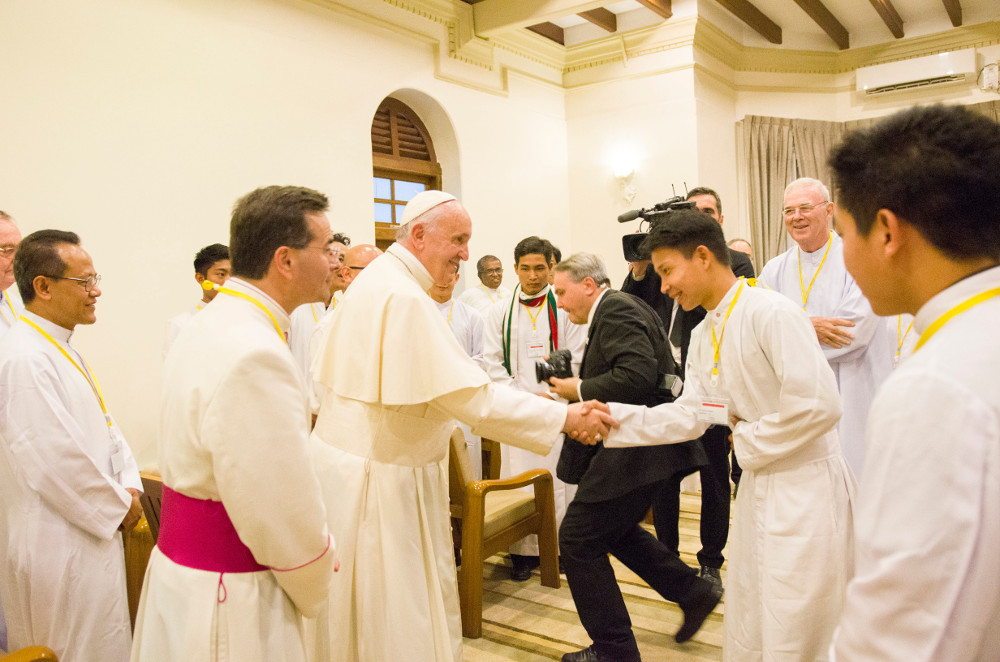
The private conversation with Pope Francis gave great joy to his Jesuit brothers in Myanmar. Almost all the 32 Jesuits and novices who live in Myanmar were able to be with him at the house of Cardinal Charles Bo where he was staying.
Despite his full and demanding schedule that hot day in the last week of November, Francis, who is soon to turn 81, appeared energised and relaxed, at home with his brothers. Vigorously he pulled the chair closer to the group, saying “I don’t want to be far from you”. Speaking in Spanish, he admitted that the visit had been seen as politically difficult. But that is precisely why I should come, he affirmed. As Paul VI told us in 1974, we Jesuits should be at the crossroads. Myanmar is now at a crucial historical turning point. Without mentioning directly the decades of misrule and neglect that the people of Myanmar have suffered or the current humanitarian disaster in northern Rakhine State and in the refugee camps of Bangladesh, or the conflict displacing many in Kachin and northern Shan States, the Pope simply indicated that now is the time to join forces with all who seek peace and reconciliation, all who seek unity in diversity, all who attempt to build bridges.
 Francis spoke freshly and eagerly on familiar themes, such as the freedom that God gives us to choose him or reject him; the call to Jesuits to be in and of the Church; how Jesuits should be deeply grounded, rooted in culture and in the love of God; the two necessary aromas for pastors: “the smell of the sheep and the smell of God”. Quoting Ezekiel, he spoke of the false shepherds who live richly from the milk (sustenance) and wool (clothing) of their sheep. Speaking of discernment he referred to the discerned decision of St Peter Claver that took him deeper and deeper in loving care for the slaves who arrived in Cartagena, Colombia. He spoke of his sense of shame, knowing the sacrifices the faithful made to come to pray with the Pope. To feel shame is a grace, he said, the grace Ignatius asks us to pray for in the First Week. For Francis it is the grace that helps him know how to be a pastor.
Francis spoke freshly and eagerly on familiar themes, such as the freedom that God gives us to choose him or reject him; the call to Jesuits to be in and of the Church; how Jesuits should be deeply grounded, rooted in culture and in the love of God; the two necessary aromas for pastors: “the smell of the sheep and the smell of God”. Quoting Ezekiel, he spoke of the false shepherds who live richly from the milk (sustenance) and wool (clothing) of their sheep. Speaking of discernment he referred to the discerned decision of St Peter Claver that took him deeper and deeper in loving care for the slaves who arrived in Cartagena, Colombia. He spoke of his sense of shame, knowing the sacrifices the faithful made to come to pray with the Pope. To feel shame is a grace, he said, the grace Ignatius asks us to pray for in the First Week. For Francis it is the grace that helps him know how to be a pastor.
A Jesuit scholastic who works in a slum area of Yangon sought a response from the Holy Father to the question of a young woman who had asked him: “How can I, who am in need, help another person in her need?” Come close to that person, offered the Pope. Be close. Give your presence. Be available to accompany a person in need.
The Myanmar Jesuit Mission endeavours to do just that.
The Jesuits returned to Myanmar at the invitation of several indigenous bishops and opened a novitiate less than 20 years ago. Today, some 50 Jesuits belong to the Mission, of whom more than 30 are Burmese, most of who are still in studies abroad in Indonesia, Philippines or Sri Lanka. Most Myanmar Catholics are members of ethnic minorities, so while the Jesuits’ educational institutions in Yangon and Taunggyi do serve those communities, they are open to all, whatever their ethnic or religious background. Despite lacking adequate personnel, the Jesuits have nonetheless accepted a parish in a frontier diocese that serves Kachin and Shan people, working within a catechetical college among the Kachin people; in a simple community college in a Yangon slum area where the poor are helped to rebuild their houses, and serving through a small micro credit service. In addition, Jesuit Refugee Service currently works with the several hundred thousand persons displaced within Kachin and Kaya States and at Myanmar’s border with Thailand and China.

